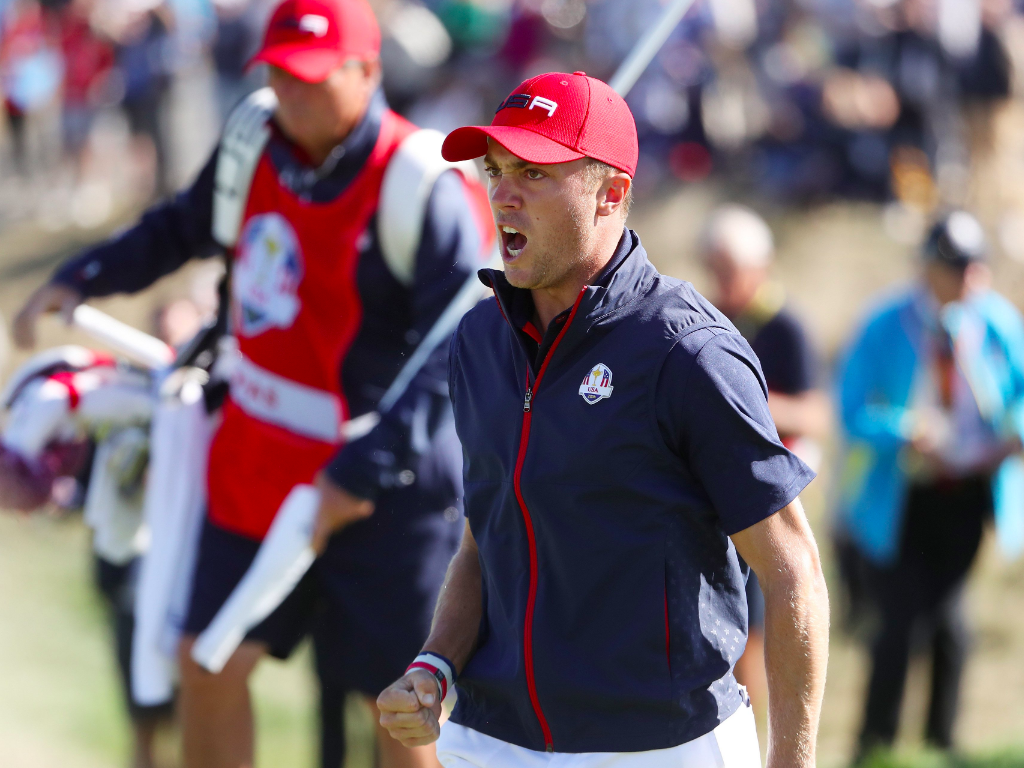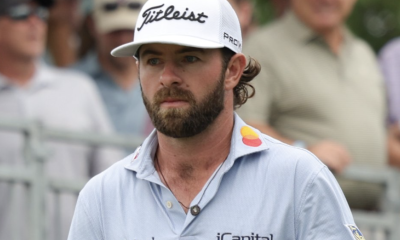Opinion & Analysis
Team U.S. will blow Europe away at the Ryder Cup (and 4 other predictions for 2021)

1. Tiger wins PGA Tour title 83
2020 wasn’t the year Tiger was looking for, primarily down to a floundering short game. However, the unpredictability of the year and the untypical state of the schedule this year would not have helped. Tiger is a man who has been prudent and wise about the events he wants to play each year, and that has only increased as the years have gone by. With a fixed schedule, Tiger will already know the events he has in mind to play, and when on it, he is still the best iron player in the world.
Woods will put himself into contention in 2021 at courses that have been kind to him all through his career, and the best closer of all time will push himself clear of the rest and confirm himself as the greatest winner in PGA Tour history.
2. Justin Thomas will end the year as World Number One
It’s as competitive as it gets up the top of the World Rankings right now, but there’s plenty of reasons to believe that JT can get to the top and stay there until the end of 2021.
JT has won 13 events on the PGA Tour, but over half of these have come at ‘off-season’ tournaments (between the Tour Championship and the Farmers Insurance). Yes he’s thrown away the odd event he should have won, but for someone as prolific as JT has been, it appears primarily to be a case of the 27-year-old just peaking at the wrong time for World Ranking points.
At the end of the 2019-20 season, Thomas said that he was “a couple rounds away in a short season from winning five or six times.” When you look at the state of his game, there isn’t a significant weakness, and it’s only a matter of time before JT turns those swing season wins into victories at the biggest events.
3. Team U.S. will blow Europe away at the 2021 Ryder Cup
The U.S. has lost seven of the last nine Ryder Cups and put them in Europe with a course set up to counter the bomb and gouge mentality, then I’d fancy Team Europe. However, there are two factors behind my belief that next year’s Ryder Cup will be a blowout.
Firstly, the caliber of players. The U.S. simply has a far superior pool of players, backed up by the World Rankings, with double the number of men currently inside the top-20 in the world. Secondly, course setup. When you have better players and the ability to tailor a course to suit their strengths, it’s akin to stacking the deck.
Forget the records over the last 20 years and look at the last time the U.S. hosted the Ryder Cup back in 2016 winning 17-11, and expect a similar scoreline at Whistling Straits.
4. Rickie Fowler will return to form
Rickie Fowler’s World Ranking has been in freefall after a shocking 2020, which saw him miss a plethora of cuts along with a failure to record a top-10 finish since January.
The 32-year-old now sits outside the top-50, thanks in part to seemingly suffering one blowup hole per round. However, watching him closely at this year’s Masters tournament, Fowler is nearer to putting a run of form together than people think and has the advantage of possessing perhaps the purest putting stroke on tour.
Fowler finished T60 in 2020 for Strokes Gained: Putting – the first time he finished outside the top-50 in this department since 2016. This year has been an outlier, and a return to his best on the greens in 2021 will see Rickie get back inside the world top-25.
5. Abraham Ancer wins at least once on the PGA Tour
Only English duo Matthew Fitzpatrick and Tommy Fleetwood rank higher in the world without winning on the PGA Tour than Abraham Ancer.
What many people overlook with Ancer, is that despite no wins yet on the PGA Tour, he did win the prestigious Australian Open back in 2018. Since then, the Mexican has excelled at the Presidents Cup in 2019 winning as many points as anyone and backed it up with a stellar year on tour where he came close on numerous occasions to winning his first PGA Tour title.
With another year of experience logged on tour (at 29, 2021 will be just Ancer’s fourth season on tour), his progression will result in victories. If he plays as heavy a schedule as he did in 2020, then multiple wins await the Mexican in 2021.
Opinion & Analysis
The 2 primary challenges golf equipment companies face

As the editor-in-chief of this website and an observer of the GolfWRX forums and other online golf equipment discourse for over a decade, I’m pretty well attuned to the grunts and grumbles of a significant portion of the golf equipment purchasing spectrum. And before you accuse me of lording above all in some digital ivory tower, I’d like to offer that I worked at golf courses (public and private) for years prior to picking up my pen, so I’m well-versed in the non-degenerate golf equipment consumers out there. I touched (green)grass (retail)!
Complaints about the ills of and related to the OEMs usually follow some version of: Product cycles are too short for real innovation, tour equipment isn’t the same as retail (which is largely not true, by the way), too much is invested in marketing and not enough in R&D, top staffer X hasn’t even put the new driver in play, so it’s obviously not superior to the previous generation, prices are too high, and on and on.
Without digging into the merits of any of these claims, which I believe are mostly red herrings, I’d like to bring into view of our rangefinder what I believe to be the two primary difficulties golf equipment companies face.
One: As Terry Koehler, back when he was the CEO of Ben Hogan, told me at the time of the Ft Worth irons launch, if you can’t regularly hit the golf ball in a coin-sized area in the middle of the face, there’s not a ton that iron technology can do for you. Now, this is less true now with respect to irons than when he said it, and is less and less true by degrees as the clubs get larger (utilities, fairways, hybrids, drivers), but there remains a great deal of golf equipment truth in that statement. Think about it — which is to say, in TL;DR fashion, get lessons from a qualified instructor who will teach you about the fundamentals of repeatable impact and how the golf swing works, not just offer band-aid fixes. If you can’t repeatably deliver the golf club to the golf ball in something resembling the manner it was designed for, how can you expect to be getting the most out of the club — put another way, the maximum value from your investment?
Similarly, game improvement equipment can only improve your game if you game it. In other words, get fit for the clubs you ought to be playing rather than filling the bag with the ones you wish you could hit or used to be able to hit. Of course, don’t do this if you don’t care about performance and just want to hit a forged blade while playing off an 18 handicap. That’s absolutely fine. There were plenty of members in clubs back in the day playing Hogan Apex or Mizuno MP-32 irons who had no business doing so from a ballstriking standpoint, but they enjoyed their look, feel, and complementary qualities to their Gatsby hats and cashmere sweaters. Do what brings you a measure of joy in this maddening game.
Now, the second issue. This is not a plea for non-conforming equipment; rather, it is a statement of fact. USGA/R&A limits on every facet of golf equipment are detrimental to golf equipment manufacturers. Sure, you know this, but do you think about it as it applies to almost every element of equipment? A 500cc driver would be inherently more forgiving than a 460cc, as one with a COR measurement in excess of 0.83. 50-inch shafts. Box grooves. And on and on.
Would fewer regulations be objectively bad for the game? Would this erode its soul? Fortunately, that’s beside the point of this exercise, which is merely to point out the facts. The fact, in this case, is that equipment restrictions and regulations are the slaughterbench of an abundance of innovation in the golf equipment space. Is this for the best? Well, now I’ve asked the question twice and might as well give a partial response, I guess my answer to that would be, “It depends on what type of golf you’re playing and who you’re playing it with.”
For my part, I don’t mind embarrassing myself with vintage blades and persimmons chasing after the quasi-spiritual elevation of a well-struck shot, but that’s just me. Plenty of folks don’t give a damn if their grooves are conforming. Plenty of folks think the folks in Liberty Corner ought to add a prison to the museum for such offences. And those are just a few of the considerations for the amateur game — which doesn’t get inside the gallery ropes of the pro game…
Different strokes in the game of golf, in my humble opinion.
Anyway, I believe equipment company engineers are genuinely trying to build better equipment year over year. The marketing departments are trying to find ways to make this equipment appeal to the broadest segment of the golf market possible. All of this against (1) the backdrop of — at least for now — firm product cycles. And golfers who, with their ~15 average handicap (men), for the most part, are not striping the golf ball like Tiger in his prime and seem to have less and less time year over year to practice and improve. (2) Regulations that massively restrict what they’re able to do…
That’s the landscape as I see it and the real headwinds for golf equipment companies. No doubt, there’s more I haven’t considered, but I think the previous is a better — and better faith — point of departure when formulating any serious commentary on the golf equipment world than some of the more cynical and conspiratorial takes I hear.
Agree? Disagree? Think I’m worthy of an Adam Hadwin-esque security guard tackle? Let me know in the comments.
@golfoncbs The infamous Adam Hadwin tackle ? #golf #fyp #canada #pgatour #adamhadwin ? Ghibli-style nostalgic waltz – MaSssuguMusic
Podcasts
Fore Love of Golf: Introducing a new club concept

Episode #16 brings us Cliff McKinney. Cliff is the founder of Old Charlie Golf Club, a new club, and concept, to be built in the Florida panhandle. The model is quite interesting and aims to make great, private golf more affordable. We hope you enjoy the show!
Opinion & Analysis
On Scottie Scheffler wondering ‘What’s the point of winning?’

Last week, I came across a reel from BBC Sport on Instagram featuring Scottie Scheffler speaking to the media ahead of The Open at Royal Portrush. In it, he shared that he often wonders what the point is of wanting to win tournaments so badly — especially when he knows, deep down, that it doesn’t lead to a truly fulfilling life.
View this post on Instagram
“Is it great to be able to win tournaments and to accomplish the things I have in the game of golf? Yeah, it brings tears to my eyes just to think about it because I’ve literally worked my entire life to be good at this sport,” Scheffler said. “To have that kind of sense of accomplishment, I think, is a pretty cool feeling. To get to live out your dreams is very special, but at the end of the day, I’m not out here to inspire the next generation of golfers. I’m not out here to inspire someone to be the best player in the world, because what’s the point?”
Ironically — or perhaps perfectly — he went on to win the claret jug.
That question — what’s the point of winning? — cuts straight to the heart of the human journey.
As someone who’s spent over two decades in the trenches of professional golf, and in deep study of the mental, emotional, and spiritual dimensions of the game, I see Scottie’s inner conflict as a sign of soul evolution in motion.
I came to golf late. I wasn’t a junior standout or college All-American. At 27, I left a steady corporate job to see if I could be on the PGA Tour starting as a 14-handicap, average-length hitter. Over the years, my journey has been defined less by trophies and more by the relentless effort to navigate the deeply inequitable and gated system of professional golf — an effort that ultimately turned inward and helped me evolve as both a golfer and a person.
One perspective that helped me make sense of this inner dissonance around competition and our culture’s tendency to overvalue winning is the idea of soul evolution.
The University of Virginia’s Division of Perceptual Studies has done extensive research on reincarnation, and Netflix’s Surviving Death (Episode 6) explores the topic, too. Whether you take it literally or metaphorically, the idea that we’re on a long arc of growth — from beginner to sage elder — offers a profound perspective.
If you accept the premise literally, then terms like “young soul” and “old soul” start to hold meaning. However, even if we set the word “soul” aside, it’s easy to see that different levels of life experience produce different worldviews.
Newer souls — or people in earlier stages of their development — may be curious and kind but still lack discernment or depth. There is a naivety, and they don’t yet question as deeply, tending to see things in black and white, partly because certainty feels safer than confronting the unknown.
As we gain more experience, we begin to experiment. We test limits. We chase extreme external goals — sometimes at the expense of health, relationships, or inner peace — still operating from hunger, ambition, and the fragility of the ego.
It’s a necessary stage, but often a turbulent and unfulfilling one.
David Duval fell off the map after reaching World No. 1. Bubba Watson had his own “Is this it?” moment with his caddie, Ted Scott, after winning the Masters.
In Aaron Rodgers: Enigma, reflecting on his 2011 Super Bowl win, Rodgers said:
“Now I’ve accomplished the only thing that I really, really wanted to do in my life. Now what? I was like, ‘Did I aim at the wrong thing? Did I spend too much time thinking about stuff that ultimately doesn’t give you true happiness?’”
Jim Carrey once said, “I think everybody should get rich and famous and do everything they ever dreamed of so they can see that it’s not the answer.”
Eventually, though, something shifts.
We begin to see in shades of gray. Winning, dominating, accumulating—these pursuits lose their shine. The rewards feel more fleeting. Living in a constant state of fight-or-flight makes us feel alive, yes, but not happy and joyful.
Compassion begins to replace ambition. Love, presence, and gratitude become more fulfilling than status, profits, or trophies. We crave balance over burnout. Collaboration over competition. Meaning over metrics.
Interestingly, if we zoom out, we can apply this same model to nations and cultures. Countries, like people, have a collective “soul stage” made up of the individuals within them.
Take the United States, for example. I’d place it as a mid-level soul: highly competitive and deeply driven, but still learning emotional maturity. Still uncomfortable with nuance. Still believing that more is always better. Despite its global wins, the U.S. currently ranks just 23rd in happiness (as of 2025). You might liken it to a gifted teenager—bold, eager, and ambitious, but angsty and still figuring out how to live well and in balance. As much as a parent wants to protect their child, sometimes the child has to make their own mistakes to truly grow.
So when Scottie Scheffler wonders what the point of winning is, I don’t see someone losing strength.
I see someone evolving.
He’s beginning to look beyond the leaderboard. Beyond metrics of success that carry a lower vibration. And yet, in a poetic twist, Scheffler did go on to win The Open. But that only reinforces the point: even at the pinnacle, the question remains. And if more of us in the golf and sports world — and in U.S. culture at large — started asking similar questions, we might discover that the more meaningful trophy isn’t about accumulating or beating others at all costs.
It’s about awakening and evolving to something more than winning could ever promise.





























Paulo
Dec 31, 2020 at 1:38 pm
I’ve said it before and I’ll say it again Gianni is a bot. Perhaps even an early form of skynet
Some other Italian name
Dec 31, 2020 at 8:26 pm
Would explain why he’s such a bad journo…
Robert Fitton Scott
Dec 31, 2020 at 11:39 am
Pointless Journalism at its worst.
PSG
Dec 31, 2020 at 11:29 am
Wow, what incredible predictions!
1. The best golfer of all time will win another tournament, somewhere (where and when not specified).
2. One of the best golfers in the world who has flirted with #1 for three years will get there (for some stretch of time, how long and when not specified).
3. The team with the much better players and home field will win the Ryder Cup.
4. A guy who had a bad year but has an eleven year history of solid play on tour will bounce back (how much of a bounce back, when and why not specified). Bonus points for the really solid use of “as much as people think” which is a go-to for authors who do zero research as it actually means nothing.
5. The top-ranked guy in the world without a win has a good chance at getting a win.
Man, people have mailed it in on this site before, but this is a new bar.